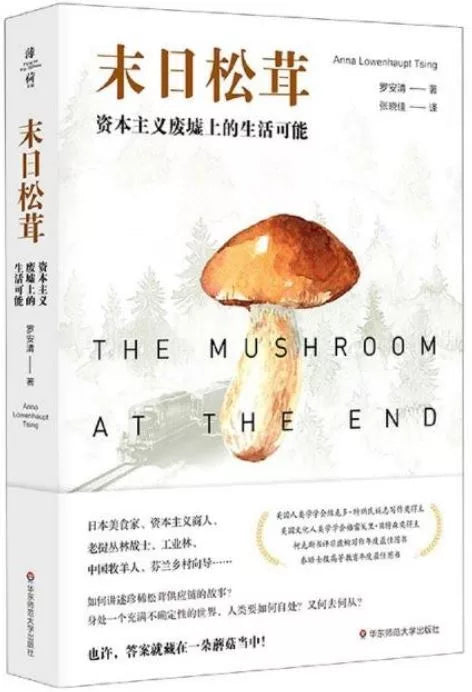1
/
of
1
Doomsday Matsutake
Doomsday Matsutake
[US] Luo Anqing Zhang Xiaojia 译
Regular price
$23.99 USD
Regular price
Sale price
$23.99 USD
Unit price
/
per
Low stock
Couldn't load pickup availability
About Book
About Book
The Mushroom at the End of the World
★ Winner of the American Anthropological Association's Victor Turner Ethnographic Writing Award ★ Winner of the American Society for Cultural Anthropology's Gregory Bateson Award ★ Kirkus Reviews Best Nonfiction Book of the Year ★ Times Higher Education Best Book of the Year [Editor's Choice]*Japanese gourmets, capitalist businessmen, Laotian jungle warriors, industrial foresters, Chinese shepherds, Finnish rural guides…how do you tell the story of the rare matsutake supply chain?
*Utopian imaginations seem trapped in a one-way future. In a world filled with uncertainty, how should humanity cope? Where should it go from here?
*The answer may lie in a unique mushroom that is entangled with human economic activities, racial history, natural ecology and apocalyptic survival strategies.
【Content Introduction】
In field research spanning Tokyo and Kyoto in Japan, Oregon in the United States, Yunnan in China, and Lapland in Finland, the author follows a little-known commodity supply chain, gradually presenting the "identity translation" of the rare matsutake: quietly breaking out of abandoned industrial forests, collected by Yao, Miao, and Southeast Asian pickers who escape to the mountains in search of freedom, and then through the fiercely competitive market for value-preserving tickets, accumulating layers of value and entering Japan, transformed into gifts with strong symbolism.
The matsutake mushroom, embodied in this unique process of trans-geographical and trans-cultural translation, also raises a broader question: As we enter the Anthropocene, what will a society without emphasis on development and progress look like? Can humans achieve peaceful coexistence with all species, without any compromise or predation?
===============================================
Rarely do you find a book that is both scholarly in the best sense of the word and flows smoothly like a well-crafted novel. "The Last Matsutake" is such a brilliant work, cleverly crafted and a delight to read. —Marilyn Strahearn, Emeritus Professor of Social Anthropology, University of Cambridge, UK
If humanity must survive the ruins of capitalism, an era some call the Anthropocene, we need an example that illustrates the unexpected intertwining of economics, culture, ecology, and survival strategies. In this book, the author offers a beautiful example, using the extraordinary example of globalized matsutake mushrooms. —Bruno Latour, French philosopher, anthropologist, and sociologist
This book uses matsutake as a lens to examine contemporary environmental history, global commodity production and supply, and science. With captivating prose, sharp and penetrating intelligence, and sustained creativity and originality, the author connects disparate topics in new and insightful ways, spanning an astonishing variety of fields. This book is destined to become a classic. —Michael Dove, Professor of Social Ecology and Anthropology at Yale University
Scientists and artists know that the key to grasping a vast subject often lies in closely observing its smaller aspects, thereby revealing the larger picture. The shape of a bird's beak reveals a glimpse into the evolution of the whole. Thus, through a close look at the fascinating mushroom, the matsutake, the author explores how the ecological crisis occurred and why it persists. Her penetrating analysis criticizes overly crude reductionism, and regarding the current human situation, she replaces panic reactions with reflections on the possibilities of rational and humane behavior. In a situation where the urgency and ferocity of an encounter threaten to overwhelm human reason, she offers a genuine method for reflection. — Ursula K. Le Guin (American science fiction, feminist, and children's literature writer)
Publication Date
Publication Date
2020-07-01
Publisher
Publisher
华东师范大学出版社
Imprint
Imprint
Mint Experiment
Pages
Pages
432
ISBN
ISBN
9787576004205
share

